From our Friends at Triratna Earth Sangha in Cambridge
From our Friends at Triratna Earth Sangha in Cambridge Read More »

Somerset Silent Rebellion in action outside Barclays Bank in Yeovil, Somerset 16th September 2023
At a recent meeting of the XR Buddhists Action Design Circle we discussed the themes from XR strategy of local engagement and outreach. We decided that it would be good to open up the discussion to the whole XR Buddhist sangha. I thought it might be helpful to share my experience here in Somerset as an example.
My first action with XR, involved sitting outside Barclays Bank in Yeovil in February 2019 as part of an action organised by South Somerset XR (SSXR). So it was meaningful for me when this July, in response to a call from XR Buddhists (XRB) to organise local actions on the same day, sitting at Barclays Banks, to try to get something happening at Barclays in Yeovil again.
Six of us participated – me from XRB, a retired vicar from Christian Climate Action (CCA), and four members (old friends) from SSXR group. The action was a great success, with a nice write-up in local media. The CCA guy was the only one with experience of this type of action. The local rebels were most happy with the way it enabled them to get the message out without any aggression, and in a visually arresting way. One of them had never meditated before, and really enjoyed it. They said, please invite us next time.
Afterwards I reflected on the fact that I had been the only Buddhist present, despite my having invited my local sangha, so I decided that in future we would need a more inclusive name, and with permission from the Cambridge group, Silent Rebellion, I created Somerset Silent Rebellion, with a Telegram chat group, now 23 members strong.
So, when the opportunity came along for another local Barclays action in September, I put out the call, and this time nine came (50% increase) – the same six from before, plus a local buddhist, a guy from Animal Rebellion, and another CCA person. Another successful action – no local media, but useful photo sharing in various buddhist and general forums, plus a plan for a Barclays meditative action at the XR southwest regional gathering (Unite to Survive) in Bath on 28th October.
The reason I’m writing this article is to encourage XR Buddhists to follow the strategic direction of XR central towards going local and reaching out to other groups. Since involving with XRB in late 2019 I’ve been up to London lots of times to join actions, but it takes time, money and effort from here in Somerset. XRB friends from further afield just don’t make it. XRB actions have been rather southeast-centric.
You can see the benefits from our Somerset experience – more people involved, more local visibility (arguably more impactful than sitting in a busy London street), less traveling, and adding to the range of styles of action that general rebels know of.
If you would like to share your thoughts on this, please write a response in the Telegram chat group and/or join the XRB Action Design Circle, on whose behalf I’ve written this piece. The XRB Action Design Circle is committed to providing materials and guidance to support people organising locally.
Andy Wistreich
Going local, reaching out Read More »
Three years ago I took part in civil resistance for the first time when I joined Extinction Rebellion for their October 2019 uprising. On my fourth day with XR I was finally arrested, minutes after my friend Satya Robin had been carried past me by six police officers, sobbing deeply. I’ve written before of that first experience of arrest but what’s kept coming back to me from those four days isn’t that, but rather the long walk home along the Thames on each of the previous three nights.
There were about 5000 of us taking action in Westminster that October, but the moment you stepped outside the protests there was no sign at all that anything was happening. Everywhere else, London just hummed along as normal. So too on the UK news channels that we all kept looking to for evidence of our actions’ ‘impact’. Barely a mention. The dissonance this generated – as if stepping back and forth each day between two completely different realities – came to a head on the third of those slow night-walks home, as I found myself looking across the Thames at the ongoing redevelopment of Battersea Power Station. The familiar old chimney-stacked giant was surrounded by the dark outlines of cranes, all lit up with red safety lights. It presented an eerily beautiful spectacle: the massive station hulked against the dark skyline beyond the river’s swirling current, surrounded by little votive lights. As I stood looking at it the unease finally gathered itself into a question that, once spoken, has never really gone away: Who exactly are you kidding?
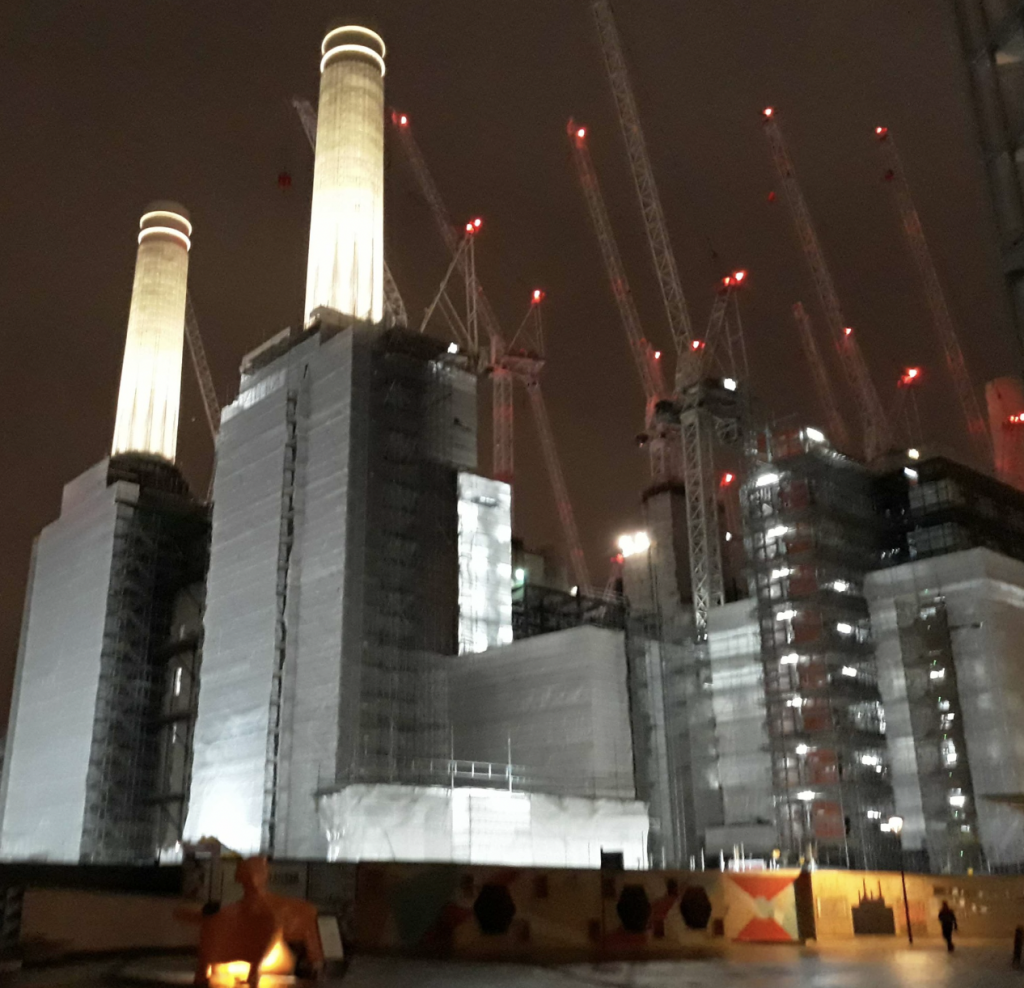
Last week I travelled up to London to take part in my first action with XR’s offspring, Just Stop Oil. There’s much to say about how the nature and tone of this new campaign has changed since 2019. As has XR’s, perhaps. What’s on my mind here, though, is how it felt to revisit the now fully revamped power station – or rather, shopping mall – the day before our JSO team walked out into a busy Aldgate junction and sat down.
Stepping inside the illuminated interior of this newly completed playground for the rich (‘every inch monetised’ as one reviewer put it) wasn’t so different to looking at it from across the river three years ago. Here in this newly unwrapped shopping mall, then, I met more or less what I’d come expecting to meet: a palpable sense of the overwhelming momentum which these civil resistance campaigns have been attempting to set their shoulder against – the brightly lit state of entrancement at the heart of our oil-fuelled consumer economy. But the reason I’m bothering to talk about this here isn’t simply to go over all that. It’s a conversation I had with my friend Geoff the following day, my limbs still heavy with that spectacle of cheerful omnicide, a few hours before heading off to meet up with the JSO team.
Geoff’s an artist and builder, and someone for whom honesty’s an involuntary virtue. When we first met around twelve years ago I’d recently become drawn to Japanese Pureland Buddhism, in large part through the unforgettable book on this tradition by the novelist Hiroyuki Itsuki: Tariki: embracing despair, discovering peace. Itsuki’s spiritual memoir spoke deeply to me at the time, as it does now. It also connected with Geoff in a way I doubt any other ‘dharma book’ would have. The melancholic authority of Itsuki’s account of his lifelong survivor’s guilt, and of how he found in the Pureland dharma of Other Power a recourse that stayed his hand more than once from taking his own life – all this feels as alive and real to me now as it did then. As I sat with Geoff in a cramped Conway Hall coffee shop I talked with him about that sense of overwhelm, stood before the old power station three years ago and last night – and about the shrillness or silliness, as it seemed to me, of any of us imagining we might somehow turn this juggernaut around ‘in the next two or three years’.
Geoff listened, intent as always. Then he asked if I might not have all this the wrong way around. Suppose it was more the case, he said, that whatever turn this is, it’s something already here – embodied not least by each of these little London roadblocks: an inexorable process of slippage with its own unpredictable tipping points, as our lethal dominant culture transitions or collapses, for better or worse, into whatever comes after it. We might choose to try and influence that transition or not, as we wish, but whatever it may or may not evolve into later is not only radically unknowable from where we stand, but curiously irrelevant.
At the heart of Itsuki’s memoir is a memory. As a 13-year-old boy he nearly lost his life when he attempted to swim the Taedong river, in full spate after heavy rains. As he reached the middle of the river Itsuki realised he wasn’t going to make it, his limbs weakening in the cold as the river’s ferocious undertow began to overpower him. By the time he somehow made it back to the bank and crawled out, this experience of the inexorable drag of the Taedong current had filled the young Itsuki with a deep sensation of his own powerlessness – a physical sensation rather than an idea, one that never left him. It’s this heavy-limbed understanding of his incapacity as an isolated individual, Itsuki tells us, that forms the beating heart of his lifelong understanding of Other Power: ‘A single drop of water in a mighty river. A person is a single drop of water in a mighty river.’
For more than ten years now this sense of being born on an invisible current is how I’ve most viscerally related to a sense of Other Power. Sometimes I’ve spoken of this current as Mother – Our Mother at the Bottom of Time, as my rosary-praying friends like to say – sometimes as Amida, Oya Sama – sometimes simply as Spirit. Whatever. I’m not very good with names – an incorrigible fidget – but insofar as Other Power feels palpable to me, it’s in these gravitational terms. Like Itsuki says, an involuntary bodily sensation rather than an idea – neither a reward for anything, nor something achieved through effort or ‘spiritual attainment’. Just, how things are when we stop trying to manipulate reality to suit our preferences.
As the familiar long wait to be processed after the JSO roadblock played itself out I spoke to my arresting officer about the chances of survival if one were to fall into the Thames at night. Not good, apparently. One of the things I learnt from this man is that the Thames has up to eleven different currents moving within it at any one time, which along with the deep cold are part of what makes it so dangerous. I don’t know where any of this goes next, and seem to have lost track of what I’d even mean by hope or despair, but I think Geoff’s right about these campaigns. Our individual actions and these transient alliances they sometimes coalesce into are of course integral to whatever transition we’re living through. A single drop of water in a mighty river. But more simply than that, what our involvement in these campaigns offers us is a way to live our lives right now as if causing harm to others – or rather, seeking not to – matters. To align our daily lives with the steadying current of nonviolence, ahimsa, caught up as we are in a collective act of intergenerational harm whose scale renders it literally unthinkable within the entranced bubble that is business as usual.
None of this feels resolved, but in here somewhere is why I feel the core of my own response to biospheric collapse, now, is to find and connect with friends with whom to lean back into Other Power with whatever years I have left. To keep turning towards living the dharma in company, as we align together with whatever un-nameable current these friendships form part of, whether or not we find ourselves presently locked or glued on to anything.
Namo Amida Bu
Mat Osmond
Follow
Mat Osmond is a writer and illustrator based in Falmouth, Cornwall. Find more of his writing at Dark Mountain and Borrowed Time
My home vigil shrine for COP26
My experience of this year’s COP26 was different as I didn’t go to Glasgow. Like others, I find going to large protests challenging due to a health condition I have, and although I have kept trying, I made the decision for COP26 to stay home.
My usual tendency is to want to be in the thick of things, up front holding the banner, showing my love and commitment through being right where it matters. Instead I found myself on my sofa in front of my laptop, when the main action was hundreds of miles away.
I had offered to help out with the Faith Bridge online vigil, which ran alongside the in person vigil in Glasgow. Two colleagues had already put in a lot of work, and I joined the team just a few weeks before the conference. As is my usual style I hadn’t thought much about it, just thought it seemed a good option as I wasn’t going to Glasgow but still wanted to be involved.
So it was actually a surprise to discover what I did: a tremendous sense of solidarity with people of all faiths – people moved by a deep care for the earth and humanity, based on timeless lineages of spiritual practice. Somehow, by having the time and space to witness this in others, these qualities opened up more deeply in me, in a way I haven’t experienced so fully before.
Taking part in the online vigil was full of treasures – sitting in silence with others on screen, each in our own homes, witnessing all the hard working rebels in Glasgow in the cold and rain sitting on the road side, listening to Muslims reciting Quran verses on stewardship of the earth, lighting candles for future generations, zooming in at 3.30am for an all night vigil,,,. It brought to life in me a sense of kinship, and of the critical importance of giving and receiving support in these momentous times. So rather than it being about “me” “being an activist” and “doing” lots of things (all of which are of course valid and necessary), in this experience I was part of a larger circle. Offering my prayers, presence and deep appreciation, and trusting that that too makes a difference.
Wendell Berry says it well: “protest that endures I think is moved by a hope far more modest than public success: namely, the hope of preserving qualities in one’s own heart and spirit that would be destroyed by acquiescence”. And I would add – alongside one another.
By Abbie who is a member of XR Meditators and XR Buddhists
COP26: Online solidarity Read More »
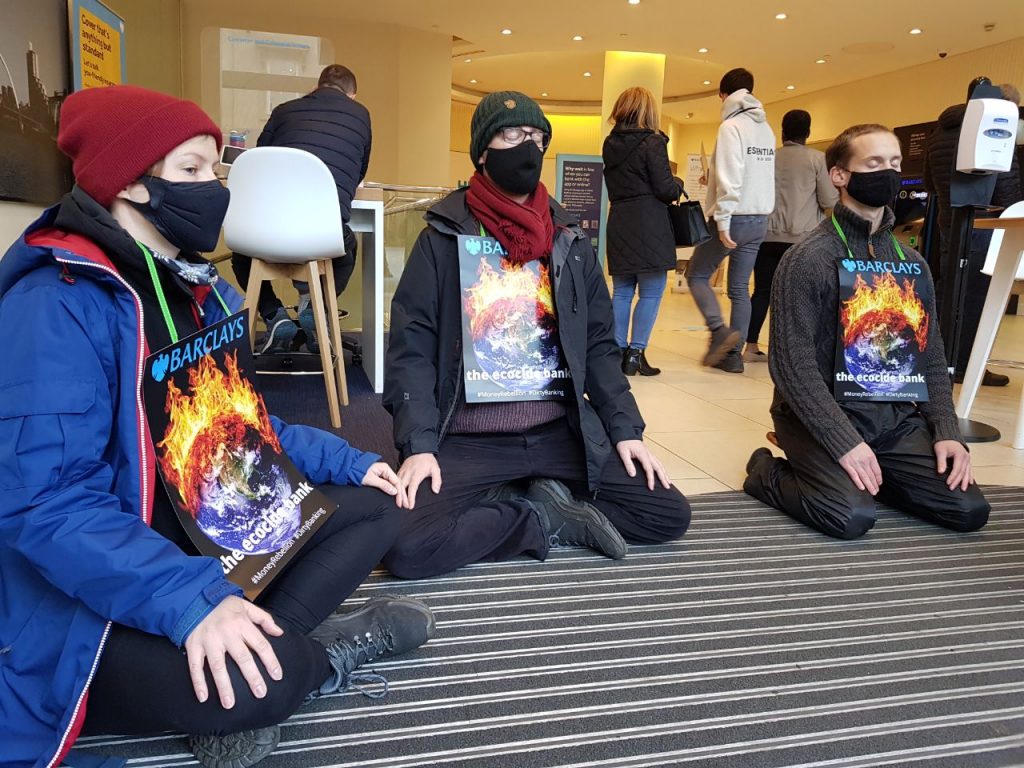
The Barclays bank security guard was loud, flustered and very quickly asked us to leave. Adrenaline surged through my system. Three of us were sitting in silent meditation. We ignored his words and kept sitting quietly with our eyes closed. I heard one of our police liaisons trying to reason with the guard, and then another voice joining in. I half-opened my eyes. This new voice was a police officer in a bright yellow jacket. How had I got here?
“Would anyone like to sit inside the bank?”
I tentatively raised my hand. Two other people put their hands up as well. Okay, I said to myself, I guess I’ll be sitting inside the bank.
Barclays bank are the biggest investor in coal in the UK, they are the most invested in fossil fuels of any bank in Europe and 7th in the world. Since the 2015 Paris agreement they have invested $145 billion in fossil fuels and despite having net zero goals in 2020 their investment in fossil fuels was higher than in 2019…
It’s clear we need an immediate end to fossil fuel extraction, and the environmental and human cost of continuing to use them will be devastating.
We were planning to mindfully walk to the bank, to sit outside in meditation with our banners and placards which read, ‘Barclays the ecocide bank’, and to hand out leaflets and talk to passers-by. If some of us agreed to sit inside the bank it would probably increase the visibility and presence of the protest.
Despite knowing all of that I was ambivalent about ratcheting up the tension by arriving just before the main protest and sitting inside the bank. Lots of positive change throughout history has come about through non-violent direct action – I know that there is value in creating the right amount of disturbance and yet I was wary.
Satya and I had decided to go home a day earlier than planned, and getting arrested would put a dent in those plans, I wasn’t sure of the value of arrest as protest in this context, I was simply tired after a few long days of demonstrating in Glasgow and knew it would be both jangling and exhausting.
I had a mix of reasons for wanting to act. From all of the very good arguments of the value of NVDA and protest, to wanting to feel useful, to competitive parts of me that compare me with other activists, to the parts of me that are flabbergasted at continued investment in fossil fuels and business as usual.
Taking all of this into account I had raised my hand.
In the bank our brilliant police liaison (a demonstrator trained in speaking to the police) continued to talk to both the police and the security guard. The police were asking how they could trust we really were peaceful, and they were letting the liaison know that we were now trespassing as we’d been asked to leave. And yet, they weren’t rushing to speak to us directly. I half-opened my eyes again. There was a police van outside now, and a whole crowd of officers, and a crowd of public, and a dozen or more other XR Buddhists sitting in meditation outside the bank.
I don’t know how much time passed. A few minutes perhaps. It felt both longer and shorter. How long could we continue to sit without risking arrest, I wondered? How much use was it to increase the drama of the protest by being here?
None of the three of us inside wanted to be arrested today, we’d each said that we’d ignore requests from bank staff for us to move, but would move when the police instructed us to.
The police convinced the liaison to pass on the message that we were now trespassing and that it was an offence to stay once we’d been asked to leave.
I stood up and had a chat with the officer. He very slowly ushered me to the door, and I sat down outside with the other XR Buddhist protestors.
We sat for another half an hour or so. I focussed on my breath, and occasionally noticed people chatting to Satya and Joe who were handing out leaflets. Some of them agreed to change where they banked after reading our leaflets filled with facts. One or two were upset with us for being there at all.
Slowly most of the police left.
As my nerves calmed I was able to unpick some of my different emotional responses to that encounter. Anger and frustration at the bank, gratitude for those sitting with me both inside and outside the bank, fear of conflict, fear of an escalation into physical violence (later I learnt one of our police liaisons had been pushed by the security guard), gratitude to the earth for supporting me, for my body for continuing to breathe, for the teachings and traditions and practices that allowed me to remain more or less steady.
The bell rang, signalling the end of meditation. We bowed, gathered up our banners and walked in mindfulness and silence away from the bank.
Later, away from the protest, as my emotions began to settle I noticed a deep well of grief for what we have lost already, the acute personal pain of the Earth’s suffering that was lodged within me, and a deep sense of connection to both the Earth and the XR Buddhists I had shared the day with.
meditating Inside Barclays Bank Read More »
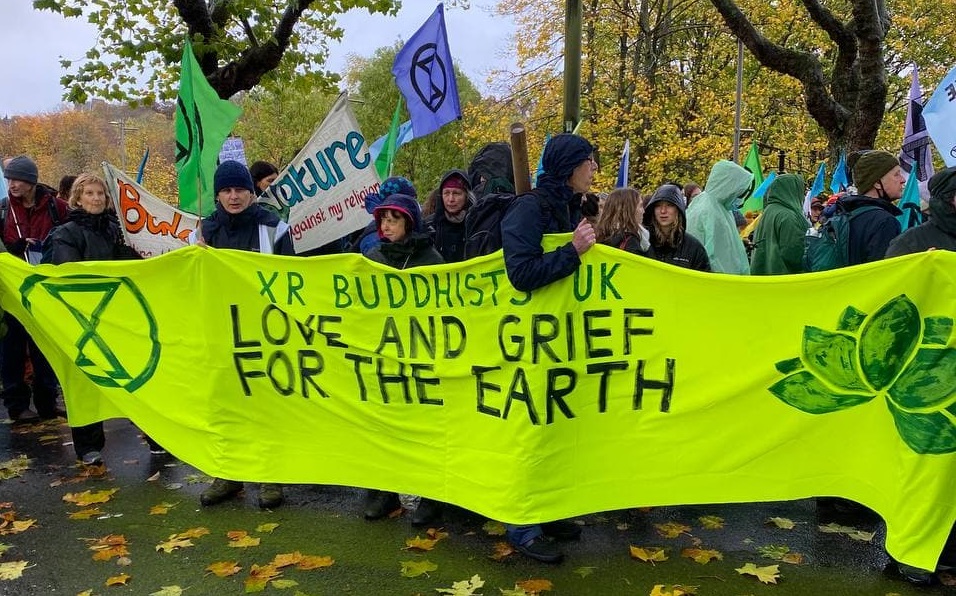
If you don’t stand for something – you’ll fall for anything.
This popular culture maxim never seemed more appropriate than it does in these increasingly turbulent and devisive times. It may sound a bit old and overused but, in light of the current state of things, it actually bears quite a fresh significance.
I spent several days in Glasgow this week, showing my support for Extinction Rebellion in their efforts to maintain scrutiny and political pressure on our world leaders, who seem to require the proverbial rocket up their backsides in order to even seem like they’re doing anything of any consequence towards the existential threat that we’re facing.
The mood in the city felt quite surreal at times. Maybe the effects of a transition for many, from a low level of awareness of all things Climate Change, to an increased presence of the matter in the press, making it all the more difficult to turn away from and maybe enhancing the sense of confusion and frustration that still surrounds the Covid fiasco. The people were mostly very sweet and helpful, and maybe a bit bewildered and overwhelmed by the sudden increase in the intensity of the shift that we’re seeing. I have certainly felt, at times, a decline in my own sense of general wellbeing as a result of being confronted with the prospect of such an uncertain future.
However, it is interesting that when we take some kind of action to address a problem that concerns us, our perspective on it can change and it can somehow, all of a sudden, seem much less daunting. I’m thinking of the Climate Emergency as a primary example here, but have experienced this effect on many occasions in the past. The impact of horror and misery diminished in the face of the kind of courage and humility that transcends our selfish interests and somehow penetrates to the heart of the problem.
In this context(activism), it felt like being removed from the sense of impending catastrophe and somehow placed above it, so as to be able to perceive it from a relative vantage point, thereby reducing its impact without negating the seriousness of it. This effect may be as simply explained as the idea that ‘a problem shared is a problem halved’. 100,000 people united in the spirit of a single cause is a much less daunting prospect than trying to tackle it alone or in small numbers. But that alone doesn’t really seem to speak to the feeling that I had as I marched through the rain soaked streets with my colleagues and friends along with thousands of complete strangers.
In reality, I never felt closer to the weight of the problem. In fact, in a certain sense, it felt amplified by being in the city, so near the beating heart of commerce, bombarded by the super-cynicism of the heavy hitting profiteers, all falling over themselves to hijack the Climate Change bandwagon and convince us all that their product will be the one that makes a difference, that plucks us from the jaws of certain death as we blindly and apathetically consume our way towards disaster!
Without the unifying effect of the XR brand of activism, I might actually have been overwhelmed by these more spiritually corrosive forces and resigned to playing the victim instead of actually standing up and claiming my rightful place amongst those who commit to challenging the status quo and staying on the right side of history.
Although this level of deceit is disturbing and, in some ways inspiring for me, it probably has a more trivialising effect for a large chunk of the population, who still have little or no sense of the devastation that awaits if systemic change is not immediately implemented. They are as likely to swallow the commercial greenwashing as they are the wanton fallacies that are being spouted by our crooked leaders, who seem to be just trying to bide their time until the story dies down, so they can get back to promoting business as usual.
We heard of a certain high profile, international business that was advising its clients that 2-3 degrees of global warming would be good for their profits, and the sooner we get there the greater the gains. This mentality highlights the naivety, cynicism and misunderstanding at the heart of the problem that we face; Which is only worsened by politicians such as Boris Johnson, who is world renowned for his lack of integrity, claiming Climate Leadership and thereby undermining the authenticity of the whole business!
You might be detecting a hint of anger and skepticism in the tone that I am writing with, but I also, believe it or not, hold out a certain amount of hope for a different future. It may be radically different from the greener and brighter future that we are being promised by the powers that be, but I still firmly believe in the resilience and beauty of the human spirit. And that, there will always be a strong current of love and hope at work in whatever survives and emerges for the prospects of posterity.
As a Buddhist I feel very lucky that I get to depend more on the qualities of my faith, that are not conditional upon societal prosperity, than to have to place all of my hopes and dreams on a system that was always doomed to failure.
Namo Amida Bu.
Dayamay Dunsby is a member of XR Buddhists UK and a teacher at Bright Earth Buddhist Temple
Trancending the Inevitable Read More »
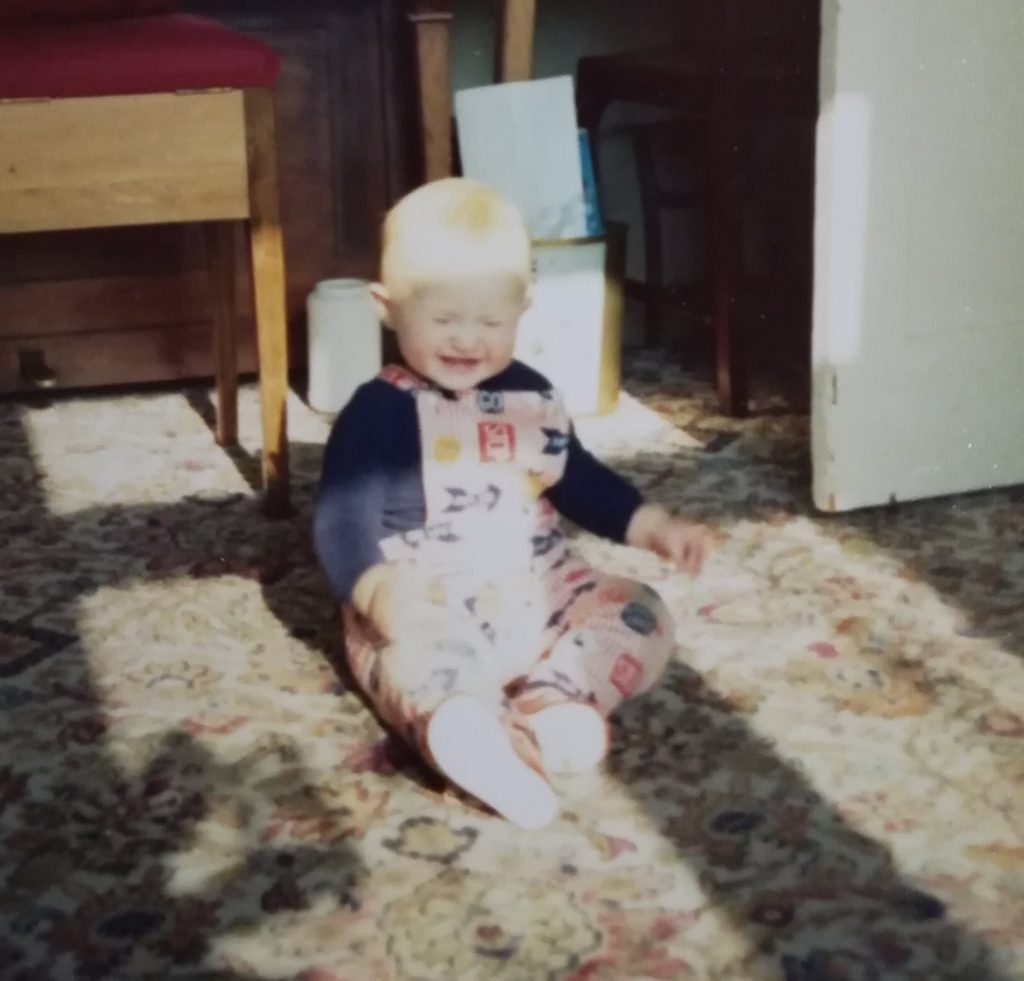
Dear Earth, I’m in court again tomorrow.
Who’d have thought that this sweet little scrap would end up breaking the law. I was always such a good girl, talking-too-much-in-class aside. I worked so hard at that. I still do.
Tomorrow I will tell the judge that I am guilty of breaking the law. I will also say that my conscience is as clear as a mountain stream. I will say that your health is more important to me than our legal system, dear Earth. I will say that all else has failed, and that it is now time for us to speak up with louder voices. With nonviolence in our hearts. With great courage.
I will hang out with Gandhi on the train*. His closest followers trained for 15 years in his ashram before the Salt March. They practiced steadiness, non-reactivity, discipline, patience. They practiced love.
My path is lit by them. It is lit by Martin Luther King. It is lit by those who have placed their soft bodies onto motorways, over and over. I am trailing behind, so far behind, but the light is clear.
We must bring everyone along with us. Those who are causing harm must be stopped from causing harm, of course. And, they must come along with us somehow, sharing your lap with us, darling Earth. How is this possible? How is it possible not to react to violence? How can we continue?
One step. Another. When we’re tired, others will carry our bags. Others will feed us cake and hear our tears. Another step. Don’t forget to listen to the birds along the way. Can you hear them?
You’ll be with me tomorrow, dear Earth. Holding me up, as always.
With much love, Satya ![]()
*The Gandhian Iceberg: A Nonviolence Manifesto for the Age of the Great Turning by Chris Moore-Backman
I’m in Court Tomrrow Read More »
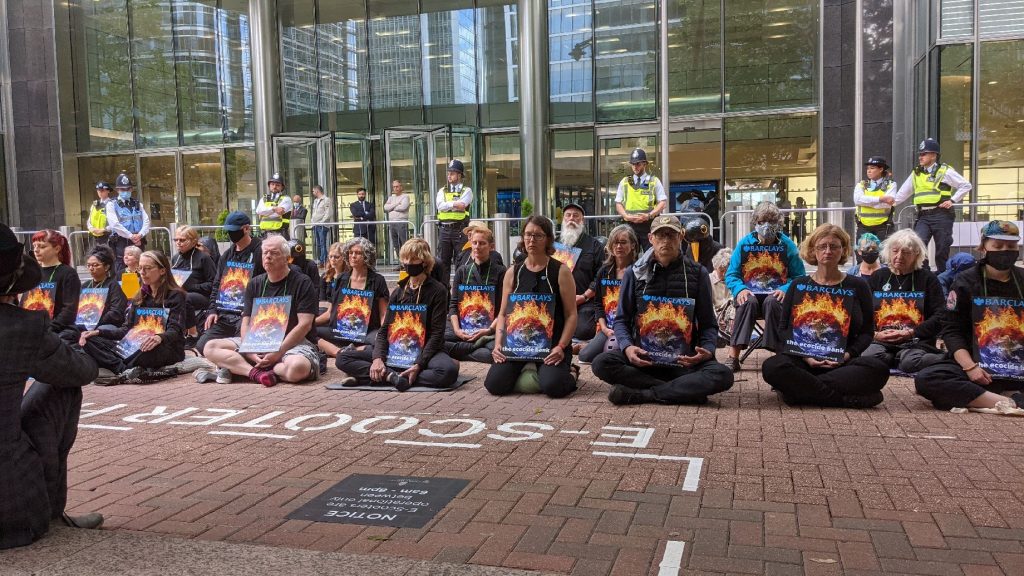
It’s mid August and I’m trying to work out how I’m going to get involved in the Impossible Rebellion. I’m not new to XR or rebellion, but the fear and the way it is influencing my connection to this Impossible Rebellion is. My heart is telling me I need to take part. It is my intention to take part. But the fear keeps whispering in my ear … It’s been months since I’ve been on the streets. It’s a year since I was at the last rebellion in London. Things have been so challenging since then. The police seem harder now. The risks feel greater. I’m stuck.
My friend and fellow mindfulness teacher Abbie invites me to join the XR Buddhists’ action at Barclays HQ and it is exactly the direct connection and invitation that I need to help me step out of my frozen state. Yes. This is something constructive I can do with my fear.
I arrive at Canary Wharf with my husband (there for morale support and to help with outreach) feeling lighter than I have done in weeks. I have found that once you see the climate and ecological emergency, once you really let it in and feel it, it is impossible to shut it out again. Sometimes I am able to carry it with me in a spirit of “active hope” as Joanna Macy terms it. But at other times the grief is almost overwhelming. Through this last 18 months of pandemic and isolation the grief has often won out over the hope for me. So noticing my lighter heart as we sit on a bench and wait for others to arrive, I feel gratitude starting to bubble up.
I’m new to XR Buddhists and this is my first meditation action of this kind. I’m always in awe of the spirit of comradeship, kindness and shared purpose that flows from person to person during XR actions. It’s wonderful to meet this spirit again as, slowly, the pairs and individuals, dressed in black, looking for each other in the young Jubilee Park, recognise each other and form a group with quiet dignity and a few smiles of recognition.
We don’t know anyone else, and my friend Abbie is taking a well earned rest from the rebellion so isn’t here. But within minutes we’ve been greeted kindly, have shared some stories and connected with people. The sense of welcome is generous and compassionate.
Joe’s holding of the group, his hosting and preparation for the action, is so moving and warm. I share my heartbreak about the climate crisis, and what inspires me about it too, with my walking partner (who it turns out is from Brighton like me – small world) in the preparation space. I listen to her words about the same things. For the first time in a while I am really letting myself feel it. And the opportunity to have a real conversation like this with another human being feels so precious. And too rare.
It’s strange how my fear – which had been strong and commanding even the day before – just evaporates. Even though the police presence is very visible and noisy with lots of walkie talkie jabber, as I tune in to my breath and the movement through my body as we slowly begin to walk from the park to Barclays, what I notice is calm, sadness, purpose and relief.
I listen to the wind blowing with some force around the base of the towers all around us. I hear the talk on the radio.
“They are setting off walking” [crackle] [beep] [crackle] “Walking … they’re walking very slowly.” [beep] [crackle]
I almost laugh out loud.
Sitting in front of the Barclays building with my fellow meditators and the blackbirds is like coming home. I don’t know how else to describe it. As we are guided to raise our hands and practice the fearless Abhaya mudra – right hand held up as if to hold hate, greed, destruction, chaos, hopelessness at bay – then later touching the ground and calling on the earth as witness, I experience a flow of energy and warmth through my body even though the wind is blowing cold and my arms are bare.
I think about my privilege. I can take an action like this with a reasonable certainty that my physical safety is assured and that if I’m arrested my legal rights will be upheld in the end. And I know this is a privilege of my white skin and my class.
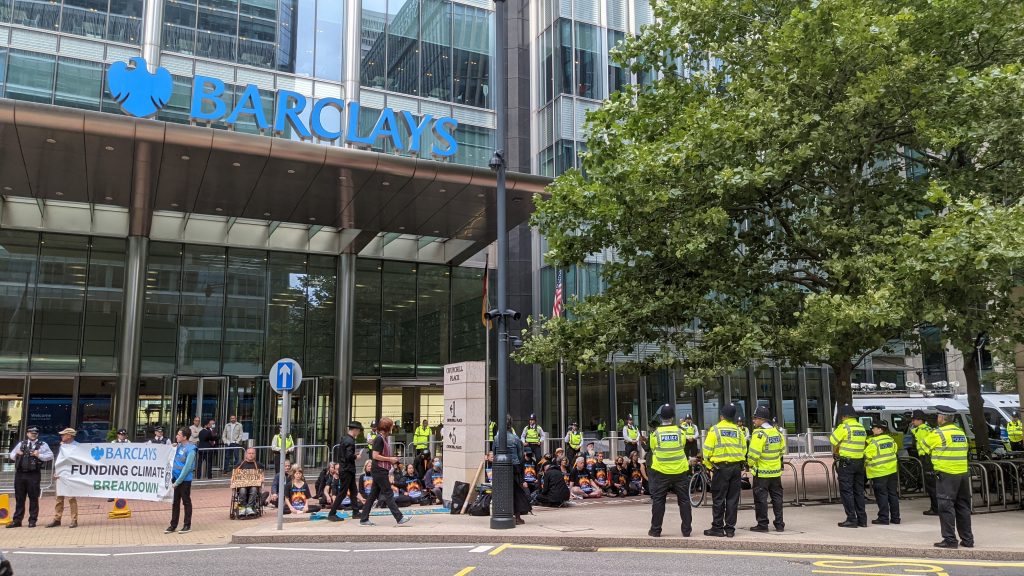
My mind moves to thoughts of what our fellow rebels might be doing on the other side of the river. I know the plan is to highlight the story of the blood money that has blighted our world and the lives of black and brown people through centuries of exploitation and violence. I send my sense of fearlessness and this energy that seems to be flowing up from the ground into my body outwards towards them across the river. I think of what this river flowing past us has seen. The goods, the plunder, the human cargo from around the planet.
When we’ve finished meditating and are about to walk back to the park, I try to look up to the top of Barclays tower. It’s not the tallest building at Canary Wharf, but I still can’t quite see the top. The glass reflects back, impenetrable. Are there people there inside? Was anyone watching? Does our meditation, our plea, our desperation to try and make people with power make different choices – does any of it make any sense to them?
On the train home I continue to tune in to the spirit of fearlessness that’s flowing through me. I’m so grateful to the people who organised the action, who held us and guided us, and to the life situation I find myself in which means I’m able to take part. I know fear will be back. It’s an unavoidable part of stepping up to the reality of this terrible, inescapable emergency we’re all facing. But I’m certain that active hope will be here for me too. That’s enough.
Stepping into active hope and holding fear at bay Read More »
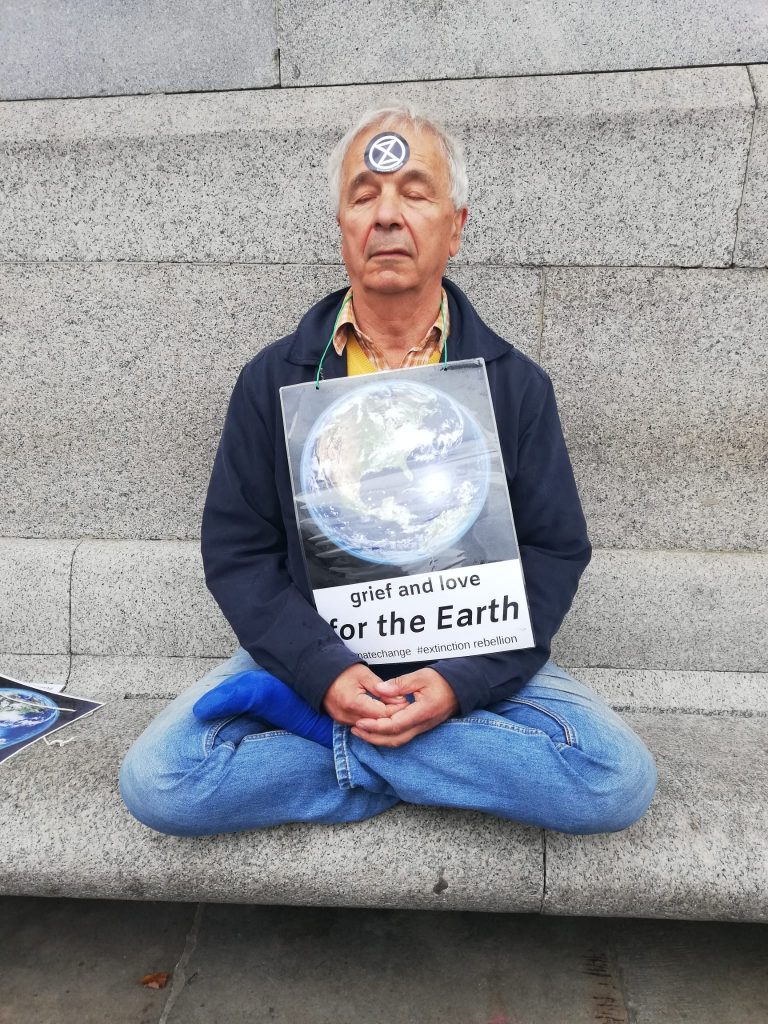
It was my second day at the rebellion. Up to now I had been engaged but not emotionally. The action at BP HQ changed that, because of the thoughts it stimulated during the meditation.
I have developed the habit of meditating on the four immeasurable thoughts during actions, somewhat as follows:
As I started to get into this meditation, I began to think about who the sentient beings involved in BP include. I began with the CEO, maybe sitting in a big office at the top of the building; then all the others in the company involved in making decisions; then the shareholders, investing in order to get a return; then the motor industry, continuing to produce vehicles that consume the petroleum; the construction companies who make the roads; the politicians who facilitate this whole process through decisions about taxation and planning policy etc; and finally, we the public, who wish to travel from A to B.
As I took the thoughts deeper, I reflected on all the karma (action) of creating the causes of mass extinction through the creation of carbon emissions through using petroleum. I reasoned that if people are ignorant of the consequences, as many of us were in the past, then the karmic consequences aren’t so great. However, now we all know. Everyone from the CEO down knows. So, like it or not, all involved in the process are creating the karmic causes of killing on a wide scale.
The Buddha taught that the karmic results of killing are several – rebirth in a lower realm; when born a human, having the tendency to kill again or experiencing being killed; and living in a place with much violence and lack of resources.
What about knowingly generating the causes of mass extinction?
Not far into this train of thought, I started to break down in tears. It happened a few times during our half hour of meditation. At one point I opened my eyes and saw the most beautiful huge trees opposite, in St James Square. This triggered a further burst of tears for all the forests and their inhabitants destroyed by warming.
As I said in the debrief after, I find this unbearable, when it pierces my inner defences. Meditation has the capacity to do this.
I am now going into retreat for five weeks. I will revisit these thoughts and feelings during the retreat, I am sure. For me, this is the benefit of being a Buddhist, that one has a method for facing and working with the grief of the unbearability of what is happening.
The situation calls for the most powerful compassion. Compassion is the basis for action. Whatever action we take, based on such extraordinary compassion, will have a powerful impact, because the mind is powerful.
Andy has been studying, practising and teaching Buddhism within the Gelug Tibetan tradition for 40 years. He joined XR in 2019, and is active in his local XR group in South Somerset.
Rebellion Report – Andy Read More »
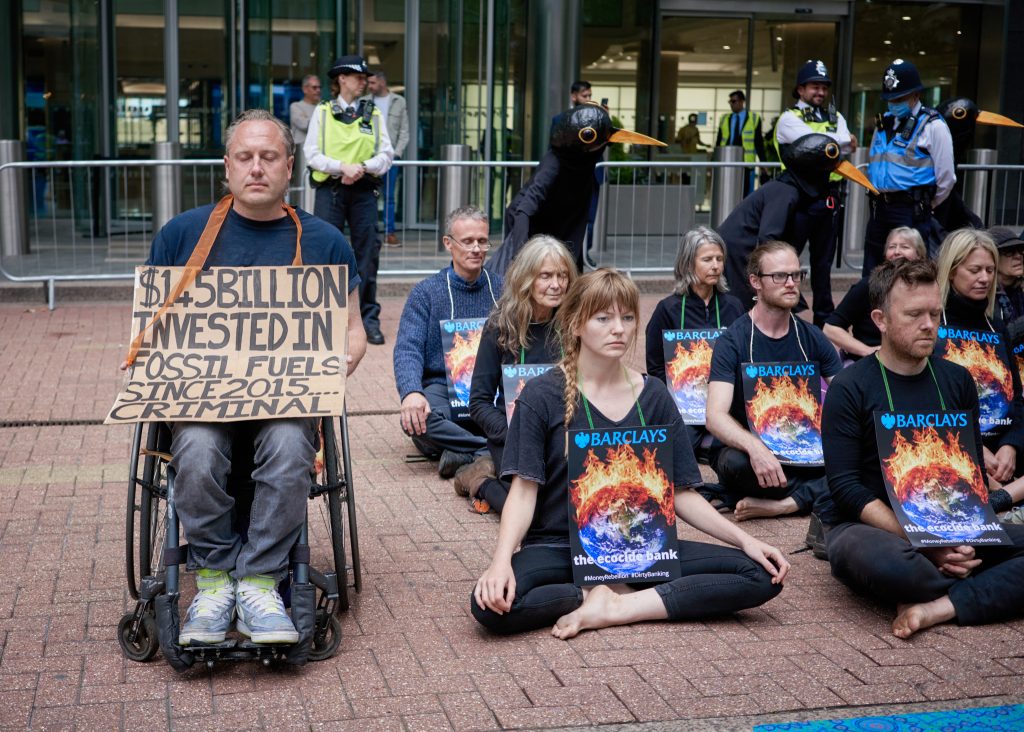
The Barclays HQ action August 27th Canary Wharf London: by Joe Mishan
As I exit the station at Canary wharf with my friend Elizabeth to join the others in the park, I notice with alarm a rather generous scattering of police; I immediately know that we have been rumbled. I am carrying a banner which is a bit of a give away I have to admit. A minute after sitting down in the park with the early arrivals for the action, the various exits to the park appear to be secreting police and security, some of whom amble casually toward us. I explain we are an XR Buddhist group and that we are constitutionally quiet, and have no intention to break anything; that we will be meditating in front of a bank in an undisclosed location. The police listen doubtfully, issue warnings about damage to property and general misbehavior before sauntering away to form an amphitheater of yellow jackets as we slowly grow in numbers.
I am gladdened to see so many of us: about 36 Buddhists some of whom I have not seen for some time. And a group of the newly formed Blackbirds who are joining us with their bird-voices and movement as a backdrop to our meditation.
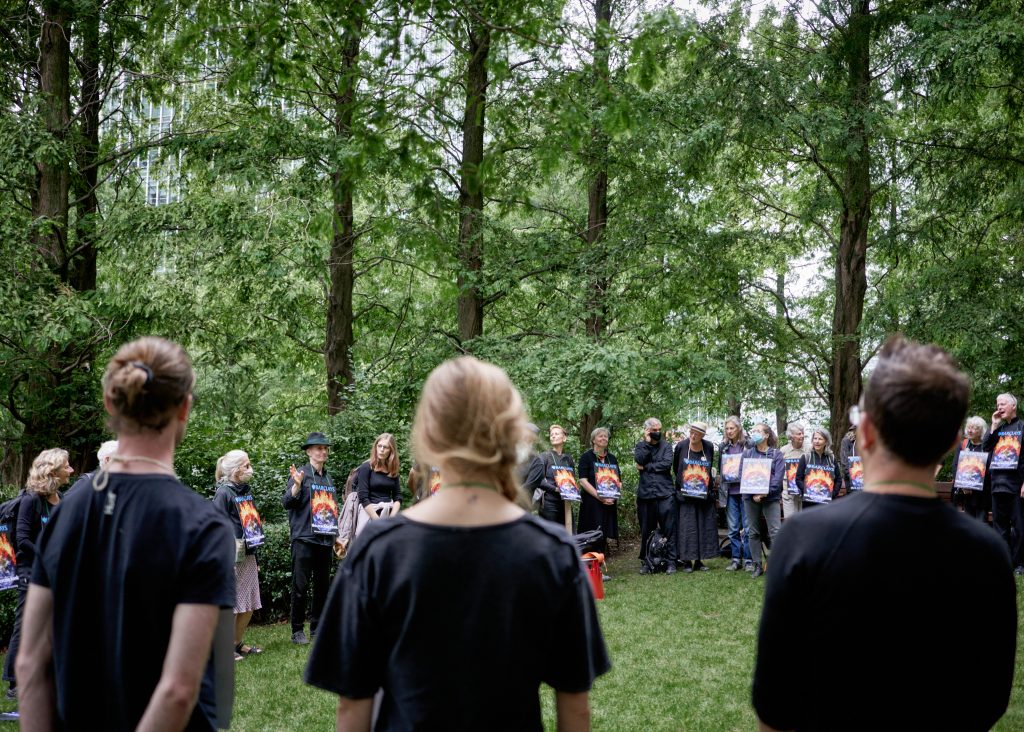
I ask the group to pair up and to reflect on the impact of the climate crisis; what breaks our hearts? What inspires us? As I’m standing in the centre of the group amid the murmur of voices, a heavily uniformed policeman approaches me and says that since I don’t have a partner he is willing to hear my reflections! This is a novel situation (which is in no XR training manual as far as I know) and I’m aware of an instant conflict between curiosity, and eagerness to take up the opportunity to see what happens – and suspicion and hostility. I decide on the former course of action, and tell him about my deep concern for my children, how my early life primed me for sensitivity to harm to the natural world, and my guilt at my contribution to the crisis. He seems attentive in a somewhat distant way. He declines to reciprocate though, saying that he is not allowed to share his opinion whilst in uniform. He does tell me however that he’s been in uniform – the army and the police – since the age of 17. I suppose I will never know what his intentions in approaching me were: and I wondered also whether he really knew what they were himself.
We form a column to exit the park. Our placards read: ‘Barclays: the Ecocide Bank’ under a picture of the Earth on fire. It’s pithy and in yer face: and also true. Barclays is the highest investor in fossil fuels in Europe. Since the Paris agreement they have poured $145bn into fossil fuel projects around the world, and despite net zero promises there is no sign of them slowing down. We set off in a slow meditation walk to the deep resonance of a single drum-beat. The sound echoes eerily off the glass and concrete of the streets.
Canary wharf is in my experience a uniquely dehumanised, de-natured place. There is something almost sinister here: a place of rigid angularity, every centimeter privatised, claimed and conquered by the corporate dollar. Gleaming surfaces occupying the vertical and horizontal planes. It was into this arid place that our march took us: the slow heartbeat of the drum echoing the heart-ache of all we have lost in the name of profit.
On reaching the towering bulk of Barclays we were greeted (or intimidated), by the sight of more than 40 police lining the edges of the roads, backed up by metal barriers. Such is the mobilizing power of meditation. We were granted a place to sit at a safe distance from the front doors of the building and we settled onto our places. I was handing out leaflets to the few passersby and was privileged to witness the soft insistent power of lines of meditators sitting in stillness. It was in intensely moving experience shared, so I heard later, by the head of security at the bank.
Shantigarba began the guided meditation as the Blackbirds gathered behind us, performing bird-language curiosity at the unusual stillness of these humans, and then joining in in appreciation with vocal calls and postures which echoed and amplified. The meditation moved through four mudras; the fierce abhaya mudra, the Earth-touching mudra, calling on the Earth to witness our belonging to web of life, then an invitation to open the eyes to see clearly into the pain being inflicting on the Earth. And finally in anjali, the meditators bowed to the Earth and sent kindness and well-wishing to all beings blighted by the impacts of the fossil fuel industry.
As I watched the silent synchronicity of movement flow across the lines of meditators, the grief I had been feeling all week broke through again. It was intensified I think by the unyielding immobility of the police ranks, the locked and closed doors and the empty glass windows of the building behind them. My grief was the grief for the lost heart of humanity; lost beyond reach in a labyrinth of greed and delusion.
After the sitting meditation we walked again in slow procession back to the park to gather again and read the Buddhist Declaration of Interdependence. It was good to be back under the few trees in the park again, their generous shelter and reliable presence.
At this action, like so many others, I was reminded of the exceptional grace and power of our faith and its expression through meditation. I felt honoured to be part of this Sangha of Buddhist activists which has such heart and courage in it.
Thank you to all who took part, and a deep bow to the Backbirds who have flown into our hearts like a blessing.
Namaste to all
Joe Mishan was one of the original co co-ordinators of XR Buddhists and is pictured below.
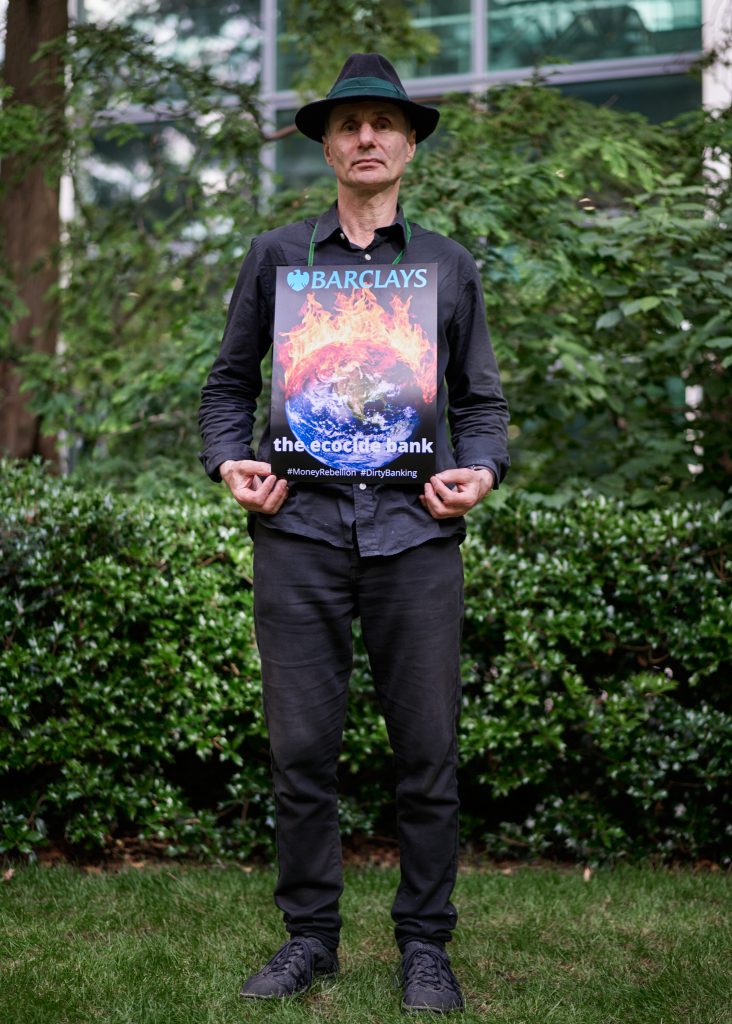
Barclays, Buddhists and Blackbirds Read More »